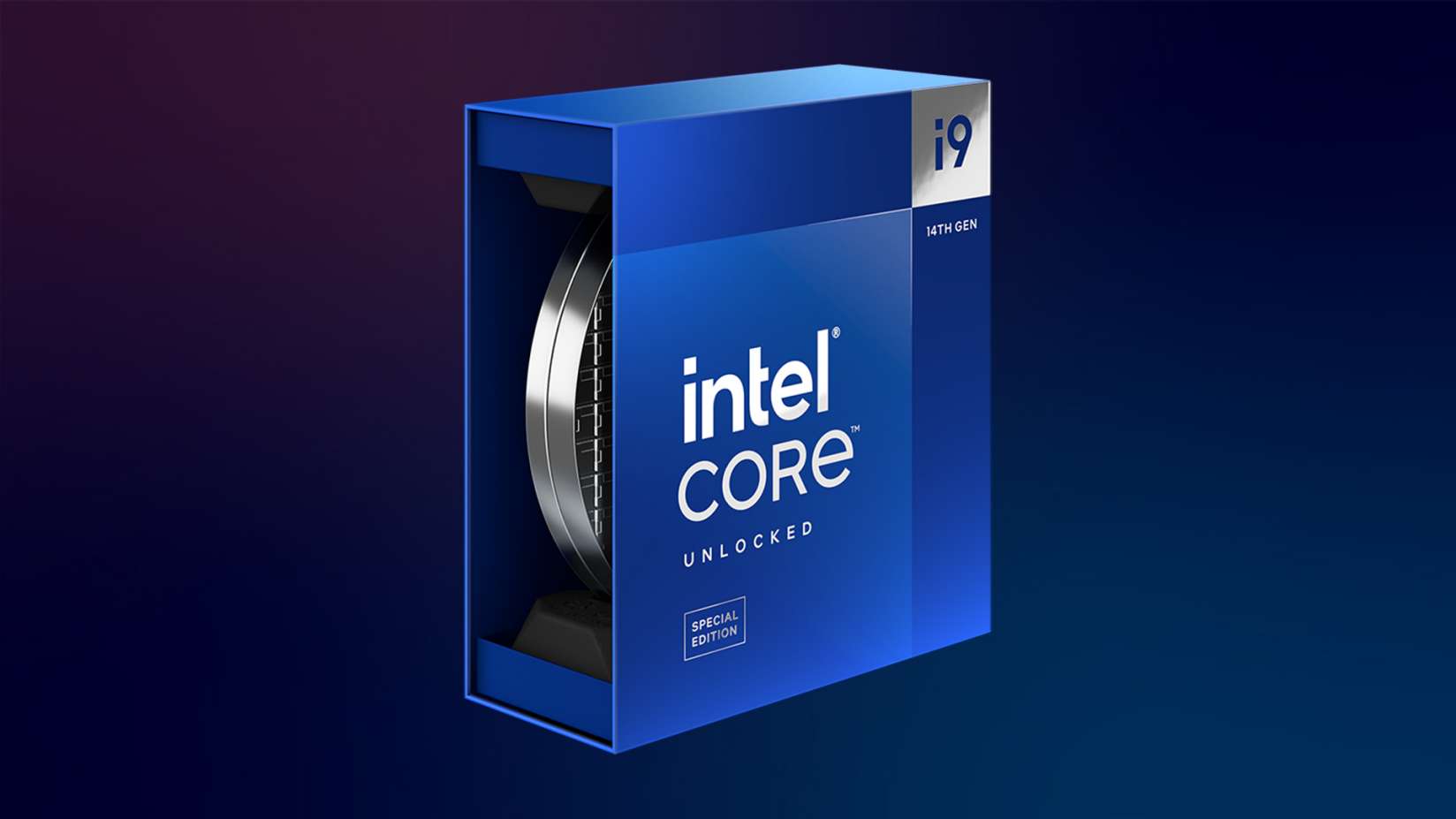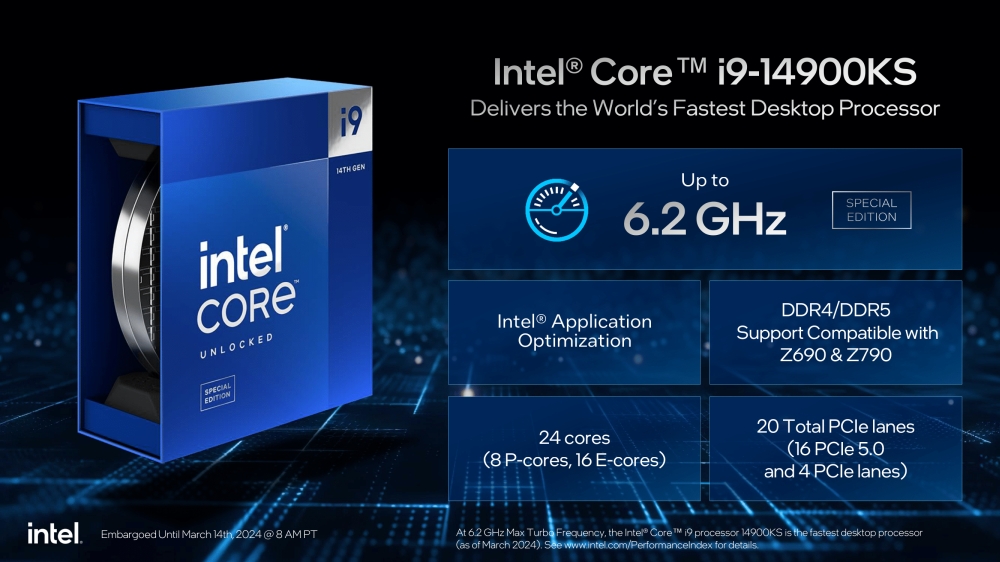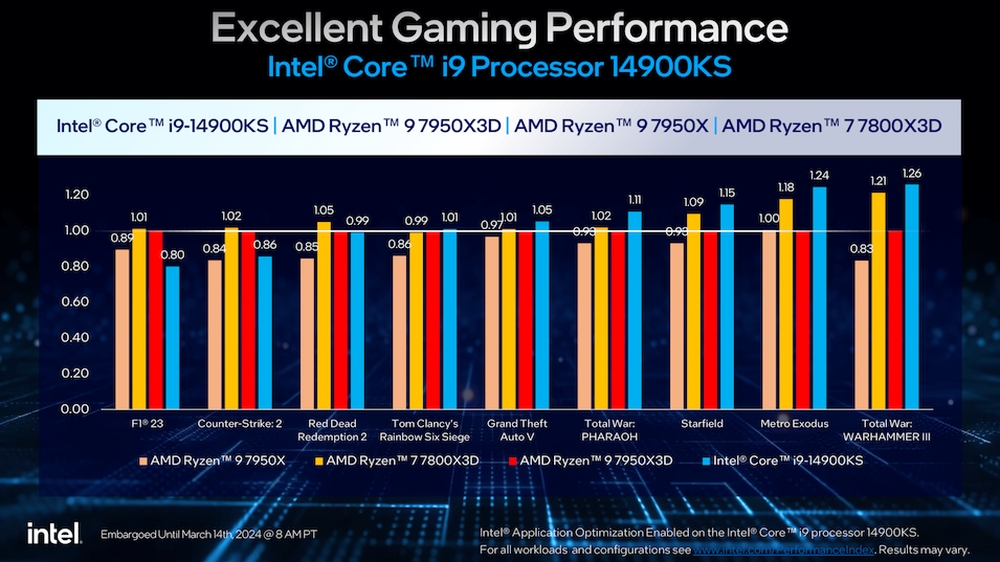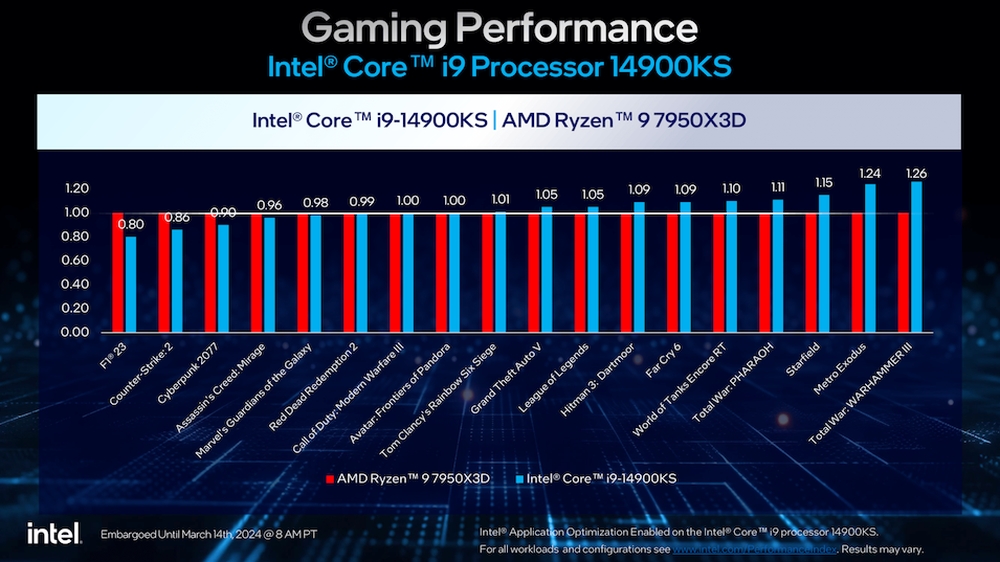 INFRA
INFRA
 INFRA
INFRA
 INFRA
INFRA
Intel Corp. climbed further up the speed clock ladder today as it launched a “special edition” Core i9-14900KS desktop central processing unit that it claims has the fastest clock speed of any currently available PC chip, making it the fastest computer processor on the market.
The Intel Core i9-14900KS clocks in at an impressive 6.2 gigahertz, but despite that record-breaking speed, the company admitted it won’t always outclass its competitors’ chips. In a series of benchmark tests presented by Intel, the new Ryzen 7000X-series chips built by Advanced Micro Devices Inc. managed to perform better in certain situations.
Intel’s previous top-performing CPU was the Intel i9-13900KS, which is a 6.0GHz chip that outperformed the fastest “regular” chip in the company’s desktop portfolio, which is the 5.8-gigahertz i9-13900K. Intel also sells the Core i9-14900K, which maxes out at 6 gigahertz as well. These top speeds only kick in when Intel’s Thermal Velocity Boost technology is activated.
Aside from its faster clock speed, the latest version in the company’s 14th generation “Raptor Lake Refresh” series is identical to the 13th-gen Raptor Lake chip. It boasts 24 cores, including eight performance and 16 efficiency cores, with 32 threads, 36 megabytes of Intel Smart Cache and 32 megabytes of level 2 cache. Those numbers are significant, as AMD’s rival Ryzen 9 7950X3D CPU boasts a massive 144 negabytes of total cache, superior to Intel’s. In addition, the Intel Core i9-14900KS also runs at 150 watts, the same as its predecessor, while demanding 253 watts under peak load.

Intel announced the chip along with a series of benchmarks to showcase its performance capabilities, comparing it with the Core i9-13900KS as well as several of AMD’s Ryzen 7000-series processors.
It should be noted that AMD has yet to announce its own latest-generation PC processors for high-end gaming and workloads this year, so the Intel Core i9-14900KS will almost certainly face more intense competition in the not-too-distant future.
According to Tom’s Hardware, Intel’s benchmarks reveal that the Intel Core i9-14900KS outperforms both its predecessor and AMD’s finest in a host of popular video games, with a 15% better performance in Metro: Exodus and a 3% edge in Starfield. However, the company does appear to concede that AMD’s best Ryzen chip does provide a performance advantage in some games.
Gamers should note that Intel’s comparisons were made when the Intel Core i9-14900KS has Intel Application Optimization or APO enabled. This is a feature that optimizes thread scheduling by pushing as much of the workload as possible to the eight performance cores.

To hit those top speeds and achieve better performance, users will also need to activate Intel’s Thermal Velocity Boost algorithm, which is a feature that allows the chip to maintain its 6.2-gigahertz clock speeds over a longer duration. However, The Register pointed out that this will require an extremely high-end cooling system. Without it, the processor will likely be forced to reduce its speed to prevent it from overheating and melting the motherboard it’s fitted inside.
Even with APO and TVB enabled, Intel’s Core i9-14900KS doesn’t always come out on top. For instance, it lost out to AMD’s Ryzen 7800X3D in the popular game Red Dead Redemption 2. As such, AMD’s upcoming Ryzen 8000X3D processors have an opportunity to outclass Intel’s finest when they make their debut, likely later this year, PC World reported.

For now, though, the Intel Core i9-14900KS appears to be the new king of desktop CPUs. It’s available to buy now for a hefty price of $699 in the U.S. Intel said it’s compatible with motherboards built around its Z790 and Z690 chipsets, and will be integrated with various new desktop systems sold by its partners.
The $699 price tag is quite competitive with AMD’s flagship Ryzen 9 7950X-3D, which offers 16 cores and comes with a massive 64 megabytes of random-access memory attached to its core complex, plus 64 megabytes of onboard memory, helping it to achieve a maximum clock speed of 5.7 gigahertz. Whether or not the massive 128-megabyte memory cache helps the AMD chip to beat Intel’s 620-gigahert clock speeds will likely depend on the exact game or workload, but in any case it’s likely to be pretty close.
Support our mission to keep content open and free by engaging with theCUBE community. Join theCUBE’s Alumni Trust Network, where technology leaders connect, share intelligence and create opportunities.
Founded by tech visionaries John Furrier and Dave Vellante, SiliconANGLE Media has built a dynamic ecosystem of industry-leading digital media brands that reach 15+ million elite tech professionals. Our new proprietary theCUBE AI Video Cloud is breaking ground in audience interaction, leveraging theCUBEai.com neural network to help technology companies make data-driven decisions and stay at the forefront of industry conversations.